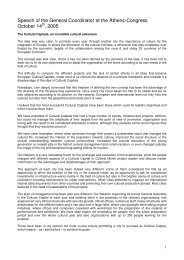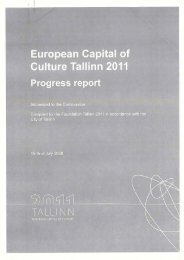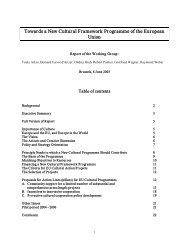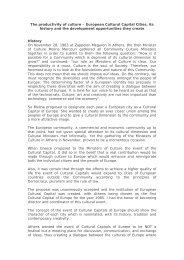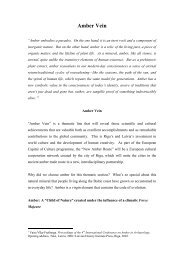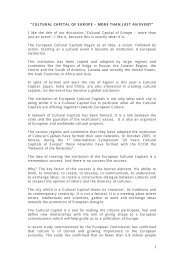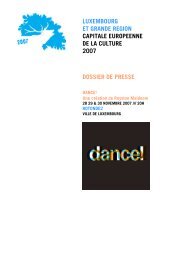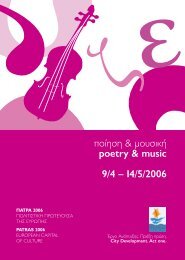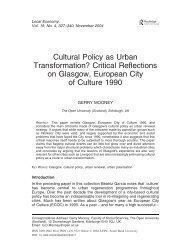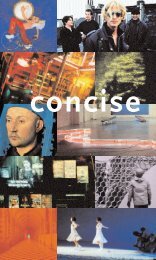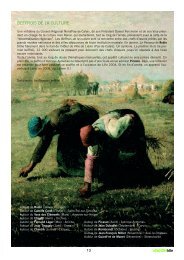Karl-Erik Norrman - Cultural Freedom in Europe 2006
Karl-Erik Norrman - Cultural Freedom in Europe 2006
Karl-Erik Norrman - Cultural Freedom in Europe 2006
You also want an ePaper? Increase the reach of your titles
YUMPU automatically turns print PDFs into web optimized ePapers that Google loves.
<strong>Karl</strong>-<strong>Erik</strong> <strong>Norrman</strong>, SG of the <strong>Europe</strong>an <strong>Cultural</strong> Parliament (ECP):<br />
<strong>Cultural</strong> <strong>Freedom</strong> <strong>in</strong> <strong>Europe</strong> <strong>2006</strong><br />
Speak<strong>in</strong>g notes<br />
The story of the K<strong>in</strong>g of Crete Idomeneo is a well-known dilemma about Man´s<br />
relation to God and religion. The German stage director Neuenfels illustrated this<br />
dilemma <strong>in</strong> a drastic way <strong>in</strong> his production of the Mozart opera Idomeneo at the<br />
Deutsche Oper Berl<strong>in</strong> <strong>in</strong> 2003. The decapitated heads of not only Poseidon, but<br />
also Jesus, Muhammed and Buddha were exposed <strong>in</strong> the f<strong>in</strong>al scene.<br />
This production was aga<strong>in</strong> put on the general programme for the ongo<strong>in</strong>g season<br />
<strong>2006</strong>-07. A lady with a season ticket on the DOB remembered the scene and<br />
called the Berl<strong>in</strong> police warn<strong>in</strong>g that the scene with the decapitated heads might<br />
provoke religious, notably Muslim spectators. The police called the Interior<br />
Senator of the City, who called the Intendant of the Opera, who asked the stage<br />
director to cancel the scene.<br />
Of course the stage director refused. The production was then cancelled from the<br />
season programme “for security reasons”. The effect was immediate: the whole<br />
cultural world <strong>in</strong> Germany and all politicians up to Bundeskanzler Merkel stood up<br />
as one man and said:<br />
“No self-censorship!” The rather over-careful decision of the Opera Intendant<br />
became the turn<strong>in</strong>g-po<strong>in</strong>t <strong>in</strong> the debate about <strong>Cultural</strong> freedom and religious<br />
consideration. The Idomeneo production has now been put back on the season<br />
programme and it does not seem likely that any Director of any cultural<br />
<strong>in</strong>stitution will embark upon self-censorship <strong>in</strong> the near future.<br />
The Idomeneo scandal reflects a feel<strong>in</strong>g <strong>in</strong> many <strong>Europe</strong>an countries that<br />
“enough is enough”. The worldwide overreaction of radical islamists on<br />
Muhammed caricatures and on a speech by Pope Benedict XVI created a climate<br />
of fear and self-censorship. In a climate of <strong>in</strong>creas<strong>in</strong>g religious fundamentalism –<br />
Christian as well as Muslim – some <strong>in</strong>tellectuals <strong>in</strong> <strong>Europe</strong> even started<br />
question<strong>in</strong>g and relativiz<strong>in</strong>g our Tradition of Enlightenment. The old Voltaire<br />
pr<strong>in</strong>ciple “I hate what you say, but I am prepared to die for your right to say it”<br />
started to become suspect or even dangerous.<br />
We have to remember that <strong>Cultural</strong> <strong>Freedom</strong> and <strong>Freedom</strong> of Expression are<br />
fundaments of our modern civilisation – not only <strong>in</strong> <strong>Europe</strong>. These freedoms are<br />
important parts of the UN Human Rights charter.<br />
Opposition aga<strong>in</strong>st <strong>Cultural</strong> <strong>Freedom</strong> has a strong tradition:<br />
- In the 19 th Century and still <strong>in</strong> the 20 th Century it was a typical<br />
conservative bourgeois attitude to be opposed to modern exponents of<br />
<strong>Cultural</strong> <strong>Freedom</strong>. But at least this opposition was non-violent. There are<br />
worse examples:<br />
- Hitler and his nazi apparatus not only killed thousands of brilliant artist of<br />
Jewish orig<strong>in</strong> but also campaigned aga<strong>in</strong>st “entartete Kunst” (for <strong>in</strong>stance<br />
the expressionist pa<strong>in</strong>ters)
- Stal<strong>in</strong> killed and deported thousands of artists and <strong>in</strong>tellectuals who had<br />
fallen <strong>in</strong>to disgrace with him<br />
- Mao deported artists and <strong>in</strong>tellectuals to die <strong>in</strong> camps and forbade<br />
musicians to play Beethoven<br />
In retrospect we can note that as a matter of fact Great Art was created as<br />
opposition to dictatorship. This is comfort<strong>in</strong>g, but not necessarily an argument<br />
for repression of <strong>Cultural</strong> <strong>Freedom</strong>…<br />
Quite frankly, the contemporary conditions for artists also <strong>in</strong>volve a lot of<br />
hamper<strong>in</strong>g factors.<br />
The Market is a ruthless animal, which limits many possibilities of creative<br />
freedom. Accord<strong>in</strong>g to some East <strong>Europe</strong>an author friends of m<strong>in</strong>e the Market<br />
has become the new Censor and has taken over the role of the communist party.<br />
The enemies of <strong>Cultural</strong> <strong>Freedom</strong> have many faces:<br />
Yesterday – the SA troops of Gör<strong>in</strong>g, Gestapo, the KGB, Stasi.<br />
Today – Neonazis, right extremists and racists, Islamists, Christian<br />
fundamentalists and various terrorist groups.<br />
Ladies and Gentlemen,<br />
The strength of <strong>Europe</strong> is its Culture!<br />
<strong>Europe</strong>an artists and other culturally active creative persons have always been<br />
the spearhead of Development. It is the conviction of the ECP that they will<br />
cont<strong>in</strong>ue to lead the development. Culture and Arts is the fundament on which<br />
<strong>Europe</strong>an Integration can be successful and <strong>Europe</strong> can assert itself <strong>in</strong> a global<br />
competition. The ECP has recently presented a Research Report, where we<br />
demonstrate how Culture is the Heart of a Knowledge-based Economy and<br />
consequently the motor for implement<strong>in</strong>g the ambitious so-called Lisbon Agenda.<br />
Culture could be considered the Comparative Advantage of <strong>Europe</strong>.<br />
We, people who are engaged <strong>in</strong> <strong>Europe</strong>an cultural cooperation and network<strong>in</strong>g,<br />
have an important task <strong>in</strong> defend<strong>in</strong>g our cultural freedom. When defend<strong>in</strong>g our<br />
Culture, <strong>in</strong>clud<strong>in</strong>g the unique <strong>Europe</strong>an <strong>Cultural</strong> Diversity, we should certa<strong>in</strong>ly be<br />
open for exchange and <strong>in</strong>fluences from other regions, but there is no reason to<br />
compromise about our <strong>Cultural</strong> <strong>Freedom</strong> or about the ma<strong>in</strong> ideas of <strong>Europe</strong>an<br />
Enlightenment.<br />
Globalisation does not have to mean that everyth<strong>in</strong>g becomes the same<br />
everywhere. There are regional characteristics which should be preserved and<br />
respected:<br />
- East Asia has a cultural identity to be respected<br />
- South Asia has a cultural identity to be respected<br />
- Sub-Saharan Africa has a cultural identity to be respected<br />
- The Arab World has a cultural identity to be respected<br />
- And <strong>Europe</strong> has a cultural identity to be respected.<br />
In this perspective it is important for the <strong>Europe</strong>ans to defend its multifaceted<br />
Identity, also with<strong>in</strong> a multicultural society.
Here <strong>in</strong> Greece we are rem<strong>in</strong>ded that <strong>Europe</strong> has a very old culture. We should<br />
be proud of this fantastic cultural heritage. On this basis we can be very open<br />
and respectful towards and curious about other cultures.<br />
But with all respect: As a representative of artistic personalities <strong>in</strong> a <strong>Europe</strong>an<br />
enlightened tradition I have to <strong>in</strong>sist: Religions should respect Culture! In<br />
<strong>Europe</strong>an <strong>Cultural</strong> tradition artists and <strong>in</strong>tellectuals are allowed to provoke<br />
people, to shock people, to irritate people.<br />
Politicians of whatever ideological colour should keep their hands off the contents<br />
of the Arts and so should religious representatives!<br />
And both politicians and religious leaders have to accept the right for Artists to<br />
provoke and to make fun of politics and religion. The trend – to be easily <strong>in</strong>sulted<br />
– is dangerous.<br />
The Word - the Image - the Tone belong to the creative artists. They should<br />
have their right<br />
to produce their word-image-tone as they please, as long as they act and create<br />
with<strong>in</strong> the frameworks of legislation.<br />
Don´t touch the <strong>Europe</strong>an <strong>Cultural</strong> <strong>Freedom</strong>!



